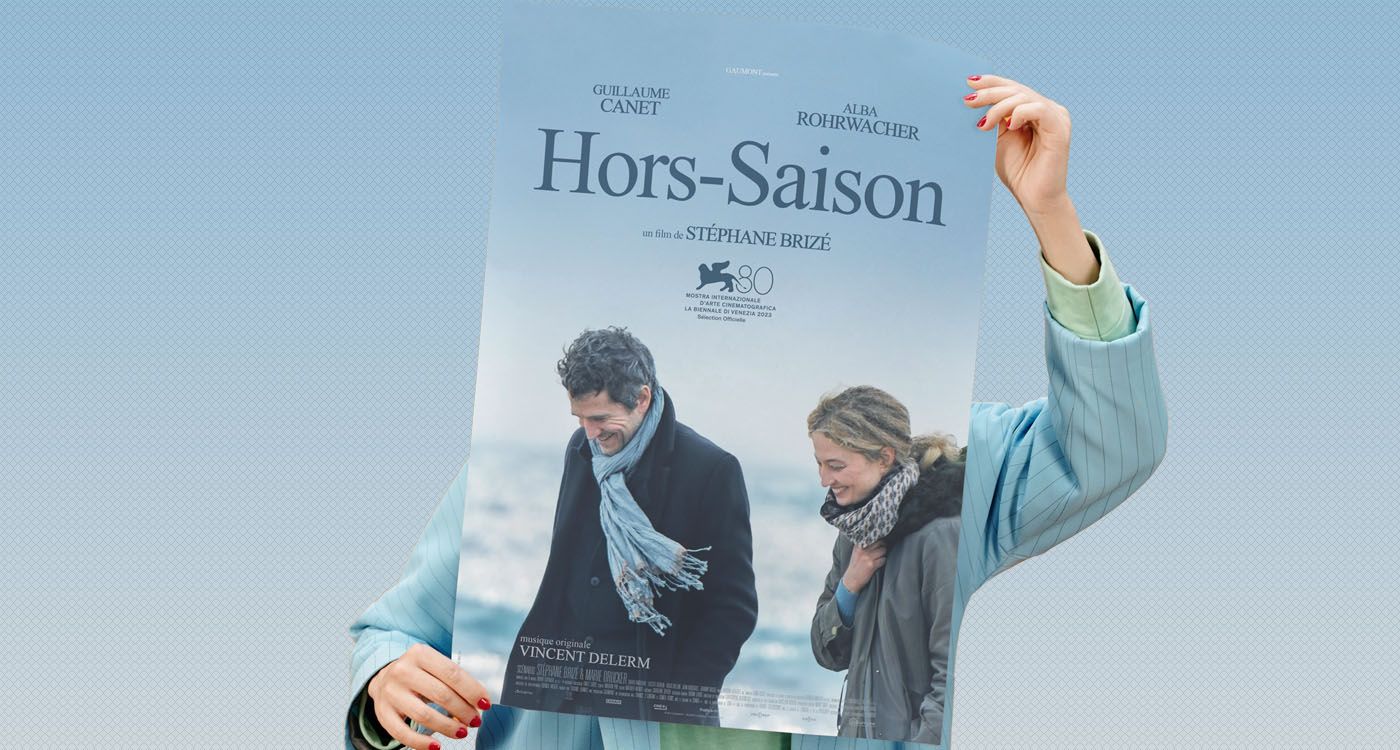
In Hors Saison (Out of Season), Stéphane Brizé delivers a subdued and deeply moving story about two former lovers reconnecting through conversation. Guillaume Canet and Alba Rohrwacher bring quiet precision to this late reunion, set against the pale light of Quiberon, in Brittany.
There is a rare elegance in Hors Saison—the kind found in stories that don’t try to put on a show. Stéphane Brizé captures a pause in two lives, a moment of respite between two diverging paths, a space where words can finally be said. He captures a man worn out, a woman incomplete and what they manage to say, or not say, when it seems like it is too late. The screenplay, co-written with Marie Drucker, is imbued with tenderness and restraint, letting emotions rise without putting them on display.
Mathieu, a famous actor, is portrayed by Guillaume Canet with remarkable subtlety. We don’t know whether he’s fleeing or trying to rediscover himself, but he arrives in Quiberon, at a seaside spa battered by the wind. This man, off-season, off-balance, is drained by media overexposure. He comes to find himself again in this hushed landscape. He is married to a well-known prime-time news anchor—beautiful, brilliant, ambitious. They have an 11-year-old son. Their daily life is tightly scheduled, every word measured, every exchange streamlined for efficiency. It quickly becomes clear that Mathieu no longer has space to voice doubt, neither at his work nor at home. Speaking has become impossible.
And there is Alice, portrayed with raw tenderness by Alba Rohrwacher. An Italian living in Brittany, she is now married to a doctor who, 15 years earlier, had prescribed her antidepressants to survive a devastating breakup with Mathieu. She has a daughter. She moved on, though she never truly healed. She didn’t try to replace what had been lost, she simply found another way. She was once a pianist, but she abandoned her career. “I didn’t play for anyone anymore,” she says, as if confessing an inner void. Love had drained her of herself. She never blamed anyone. Nonetheless, she stayed.
Chance—or fate, though Brizé never says so—reunites them in Quiberon. What might have been an awkward moment or polite conversation becomes a slow and beautiful rediscovery of words. The film lingers. It listens. It gives these two people a space to speak again. Not to relive their story, but to reread it together. With the delicacy of Hiroshima mon amour, with the gentle tension of A Man and a Woman, or rather a woman and a man, because here, it is Alice’s voice that leads the narrative.
It’s hard not to think of that iconic beach scene in Lelouch’s film—the wandering along the shore, the distance to be bridged, the hesitation before a gesture. Brizé’s beach is paler. Less romantic. But it, too, carries the weight of impossible reunions, the deeply human “neither with you nor without you,” a phrase borrowed from Truffaut’s The Woman Next Door, and later turned into a song by Vincent Delerm, who wrote the score in this film. And so they meet again—not in the images of the past, but in the bare truth of the present.
Mathieu opens up to her as he has to no one else. It’s not that she listens better than his wife—she listens differently, without expectations, without defenses. He can tell her he’s at his breaking point. That he no longer knows what role he’s playing, which film he’s in, or for whom. For once, he doesn’t have to pretend. He smiles at her still-intact Italian accent: “Zero progress,” he says, half-teasing, half-tender—as if acknowledging a quiet loyalty to what they once were.
She, in turn, finally finds the space to voice what she’s kept buried for so long. Not accusations—there’s no bitterness in Alice—but a raw truth. The fact that he had left her for someone else. That she had remained broken. And that she had taken refuge elsewhere, not to live differently, but simply to go on living. The film doesn’t force anything. Everything plays out in the glances, in silences that stretch.
Then comes the stunning scene at the heart of the film: a wedding hall, strangers dancing. Amid them, Mathieu and Alice. This dance is the emotional core of the film. They’re not reenacting the past. They’re not dreaming of a future. They’re simply there, together, in a suspended moment made almost sacred by music. The melody, composed by Vincent Delerm, returns like a gentle refrain—never sung, always discreet. It wraps around their gestures, their quietly reclaimed intimacy.
Brizé leaves what follows unresolved. This isn’t a film of reunions, nor is it a melodrama. It’s a story of peace and clarity.
Hors Saison is a film about what changes when you’re finally able to say what you’ve kept silent for years. It’s not about rekindling a romance, but about the solace of a woman who can finally move on without denying what once was, and the solace of a man rediscovering his own vulnerability. It may be one of Guillaume Canet’s finest performances. He deeply embodies doubt without turning it into a performance. And Alba Rohrwacher, with her wounded grace, is simply heartbreaking.
In the pale light of Quiberon, on deserted beaches, in impersonal spa rooms, Brizé films an undone love with immense tenderness. He films absence, grief and the breath of air that emerges when two people finally accept to speak. The film stops where something new quietly begins.

Comments